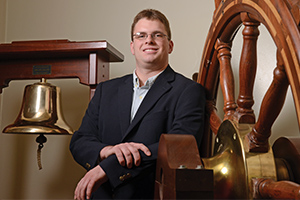Making Waves

Tommy Sheppard, History
Tommy Sheppard, a Ph.D. candidate in the University of North Carolina at Chapel Hill Department of History, cannot pinpoint the moment when he realized his future lay in the past.
Growing up in Alabama, he would read about and study history and watch the History Channel. "It always fascinated me," Sheppard recalls. "I can't remember a turning point in my life when history grabbed me. It's always been compelling to me."
So when the time came for Sheppard to decide what he would study in school, history was the natural choice. He received his bachelor's degree in History at Troy University in Alabama and his master's in War and Society in the Department of History at Florida State University. He's now completing his third year as a doctoral student at Carolina.
The funding he receives at Carolina has enabled him to fully focus on school rather than balancing an outside job in addition to his academics. "Earning a Ph.D. would have been a very daunting process without funding," he says. "Diving in would have been a tough decision to make. But when I learned I would receive financial support, I was grateful for the opportunity." Sheppard works as a teaching assistant, a job that has the added benefit of preparing him for a career that includes teaching.
Sheppard studies military history with a concentration in American history, naval history in particular.
He researches civil-military relations, or "the relationship between the armed and the unarmed in society, the military and the civilian population." In his dissertation, Sheppard examines the rapport between naval officers and the Secretary of the Navy (and occasionally the President) from the American Revolution through the War of 1812. That relationship has not always been smooth sailing.
"I'm looking at an era when communication with the navy was minimal and unreliable," he says. "There was really no way to get in touch with a ship at sea. Mail service was very sporadic. Once the ship sailed, they were on their own, and the captain had an almost godlike authority over all of his subordinate officers and the seamen. This didn't foster a mentality of subordination to their civilian superiors when they got back into port."
The tension between these two groups during this time period was evident to Sheppard when he began reading correspondence from the period at both the National Archives and the Library of Congress in Washington, D.C. One of the most intriguing stories he found while exploring those archives is the story of a naval officer who was willing to sacrifice his career after a disagreement with the Secretary of the Navy.
The archival materials tell the story of naval officer Thomas Truxtun, who served during the American Revolutionary War and after. At the end of his career, Truxtun commanded a squadron of ships, but he still had to serve as captain of the ship on which he sailed. He bristled at this situation. While tending to the day-to-day needs of one ship, he reasoned, the squadron as a whole might not get the attention it needed. If he made an oversight or a mistake due to the arrangement, his reputation would be in jeopardy.
Truxtun asked the Secretary of the Navy for a captain to deal with the daily responsibilities of the ship on which he sailed so that he could manage the squadron more effectively. When the Secretary refused, Truxtun resigned in 1802, saying "I owed my life to the service of my country. But I knew of no duty imposing on me the obligation to sacrifice my reputation."
Filled with information such as this, Sheppard's dissertation could ultimately turn into a book, he hopes. But that's not the best part of writing, he says. "There is a real thrill in reading a huge stack of books on a subject by established historians you admire and being able to say 'Aha! They missed something.' The sense that to some small degree you're adding yourself to that stack of books or inserting yourself into the scholarship gives the most satisfaction."
♦ Laura Lacy
Photo by Will Owens


